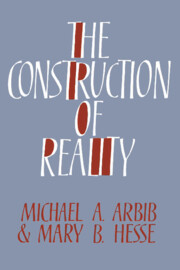Book contents
- Frontmatter
- Contents
- Preface
- Chapter 1 Posing the problem
- Chapter 2 The intelligence of the artificial
- Chapter 3 Schema theory
- Chapter 4 Relating mind and brain
- Chapter 5 Freedom
- Chapter 6 Freud on psychology and religion
- Chapter 7 Schemas: from the individual to the social
- Chapter 8 Language, metaphor, and a new epistemology
- Chapter 9 Interpretation and reality
- Chapter 10 Religions as social schemas
- Chapter 11 The Great Schema
- Chapter 12 Secular schemas
- References
- Author index
- Subject index
Chapter 8 - Language, metaphor, and a new epistemology
Published online by Cambridge University Press: 22 September 2009
- Frontmatter
- Contents
- Preface
- Chapter 1 Posing the problem
- Chapter 2 The intelligence of the artificial
- Chapter 3 Schema theory
- Chapter 4 Relating mind and brain
- Chapter 5 Freedom
- Chapter 6 Freud on psychology and religion
- Chapter 7 Schemas: from the individual to the social
- Chapter 8 Language, metaphor, and a new epistemology
- Chapter 9 Interpretation and reality
- Chapter 10 Religions as social schemas
- Chapter 11 The Great Schema
- Chapter 12 Secular schemas
- References
- Author index
- Subject index
Summary
Language as metaphor
In the previous chapter, we made some suggestions about a schema theory of language acquisition by the child, for whom language is initially an external reality to be mastered. We also noted that the external language is itself a social construction – a “collective representation,” as Durkheim called it. In this section, and more particularly in Chapter 10, we start to build some bridges between the essentially individualist approach and a more comprehensive picture of language as also embodying the constructions and classifications of a culture. In this area there are plenty of empirical studies on which to draw, deriving from literary criticism, social anthropology, and the history of ideas and of science, as well as Wittgensteinian philosophy. However, cognitive science is as yet an infant in these worlds, and we cannot claim to have more than hints for an adequate theory of such social schemas. In this section, we concentrate not on the empirical aspects of sociolinguistics but on the philosophical implications of our theory of language so far.
Our emphasis on the dynamics of meaning change and its holistic character already brings us into conflict with a long-entrenched philosophical tradition. Speaking of the suggestion that the meaning of words changes whenever our mental state changes, when, for example, we acquire more knowledge about the subject matter, Putnam (1981, p. 22n) says this “would not allow any words to ever have the same meaning, and would thus amount to an abandonment of the very notion of the word ‘meaning’.”
- Type
- Chapter
- Information
- The Construction of Reality , pp. 147 - 170Publisher: Cambridge University PressPrint publication year: 1986

